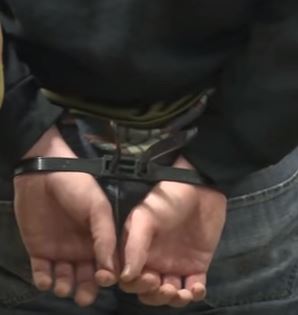
The Times of Israel: A military tribunal in Tel Aviv on Wednesday convicted of manslaughter an IDF soldier who shot and killed an incapacitated Palestinian assailant, concluding a high-profile trial that deeply divided the country. His attorneys accused the court of bias and vowed to appeal.
The verdict on Sgt. Elor Azaria, 19, was delivered by a panel of three judges at the army’s Kirya headquarters, a change of venue from the Jaffa Military Court’s usual meeting place in the city’s south. Outside, scores of activists demonstrating in support of Azaria — among them far-right supporters of the Beitar Jerusalem soccer club — clashed with police and border guards dispatched to maintain order. Two people were arrested when protesters attempted to block Kaplan Street, a main avenue running outside the compound.
Azaria’s trial saw politicians and current and former army generals alternately supporting or condemning the soldier’s actions. Many of the army’s top brass, as well as former defense minister Moshe Ya’alon, had railed against Azaria’s “unethical” decision to shoot the assailant, Abdel Fattah al-Sharif, in the head nearly 15 minutes after the latter was shot and wounded as he attempted to stab an IDF soldier in Hebron last March.
In the lengthy, unanimous decision, which she read for almost three hours, Judge Maya Heller described the circumstances of the shooting and summed up the indictment and defense, before tearing into many of Azaria’s claims. The judges concluded that Azaria’s testimony was “not credible,” that he had opened fire out of a desire for revenge, and that the shooting was “not justified.”
Sentencing is to follow at a later date.
Dismissing one of the defense’s key arguments to the effect that the stabber was already dead when Azaria opened fire at close range, Heller said, “We have adopted the conclusion that the terrorist’s death was caused by the shooting by Azaria.” She castigated the defense, which posited that Azaria had acted out of a sense that Sharif still posed a danger to his comrades while also making the apparently contradictory claim that he was already dead when Azaria shot him.
Citing testimony of Azaria’s commanding officer and a paramedic, who recalled that upon arriving at the scene minutes after the attack, Azaria had said Sharif “deserves to die,” Heller said there was no indication Azaria felt threatened by the mortally wounded attacker, and that a member of the security forces had moved the knife away from the attacker minutes prior to the shooting.
She added that the claim Azaria had reacted because Sharif was reaching for his knife was unacceptable, as video from the scene showed that the knife was out of reach. Moreover, she said, the claim that the footage from the field was doctored was baseless.
At the scene, “Elor didn’t raise concern of a knife or a bomb as an explanation for the shooting, but rather that terrorists deserve to die,” she maintained, terming Azaria’s version of the incident and his thinking, which changed several times over the course of the trial, “unreliable” and “problematic.”
“There is no grounds for the claim of self-defense,” she said. “Azaria’s shooting was unjustified.”
“The fact that the man sprawled on the ground was a terrorist, who had just sought to take the lives of IDF soldiers at the scene, does not in itself justify disproportionate action,” Heller added.
Azaria’s lawyers said they would appeal the verdict, while members of his family berated the judges, calling the decision a “disgrace.”
“We said from the outset that the court was with the prosecution,” said attorney Ilan Katz, bemoaning the “tough” verdict. His colleague Eyal Besserglick accused the judges of “hostility” toward the defense during the proceedings, and said Heller had “giggled” while reading the decision.
Earlier, Azaria arrived at the court with his family and smiled as supporters thronged around him, giving the soldier hugs and wishing him well.
The last day of the court proceedings was closed to the general public, and no video or audio feed from the courtroom was provided. Azaria’s family was among those permitted to be inside the courtroom when the verdict was read. Dozens of demonstrators, among them Likud MK Oren Hazan, gathered outside the complex to show support for the soldier.
Some held banners reading, “People of Israel do not abandon a soldier in the battlefield”; others held aloft signs in support of US President-elect Donald Trump.
Some in the crowd at one point chanted, “Gadi be careful, Rabin is looking for a friend,” referencing IDF Chief of Staff Gadi Eisenkot, seen by Azaria’s defenders as having abandoned him, and the assassinated prime minister Yitzhak Rabin.
Security had been bolstered around the Kirya in expectation of riots in case of a conviction, and some 350 police officers were stationed there.
Right-wing politicians and hundreds of Azaria’s supporters have insisted he was treated unfairly by left-wing elites in the army and media.
Thousands rallied for Azaria’s release following his indictment in April, and his family have waged a fierce campaign against the trial and raised hundreds of thousands of shekels to cover legal costs.
Azaria was filmed shooting Sharif on March 24, 2016. The footage, which was published online shortly after the incident by the left-wing advocacy group B’Tselem, sparked an intense debate in Israel about military discipline and ethics in the midst of a wave of Palestinian terror attacks that began in September 2015.
Military prosecutors at first sought murder charges against Azaria, but the difficulty of proving the soldier’s intent led to a reduced indictment for manslaughter. According to prosecutors, Azaria’s actions explicitly contravened the IDF’s rules of engagement, which stipulate, in accordance with Israeli law, that deadly force cannot be used once the assailant no longer poses an immediate threat. The court emphatically endorsed this argument.
Azaria’s defense attorneys argued that their client believed that Sharif still posed a threat to himself and his fellow soldiers, suspecting he may have been rigged with explosives.
Since his April 18 indictment, media attention has been intense, focusing on the testimony provided by fellow IDF soldiers and officers throughout the trial.
On Tuesday, IDF Chief of Staff Lt. Gen. Eisenkot alluded to the case, rejecting the campaign slogan of Azaria’s supporters that depicted him as “the child of us all.”
“He is not our child…. He is a warrior, a soldier, who must dedicate his life to carry out the tasks we give him. We cannot be confused about this.”
Speaking at a conference at the Interdisciplinary Center Herzliya, Eisenkot added: “This confusion in the Israeli discourse is a discourse that undermines the most fundamental values that we look for in our soldiers.”
The army’s live-fire rules in the West Bank, he said, “have not changed in a decade.”
The last time an IDF soldier was convicted of manslaughter was in 2005, for the killing of British civilian Tom Hurndall two years earlier. The soldier, named only as Sgt. T., was sentenced to eight years in prison for manslaughter and six other charges. Manslaughter carries a maximum term of 20 years, but no minimum punishment.




